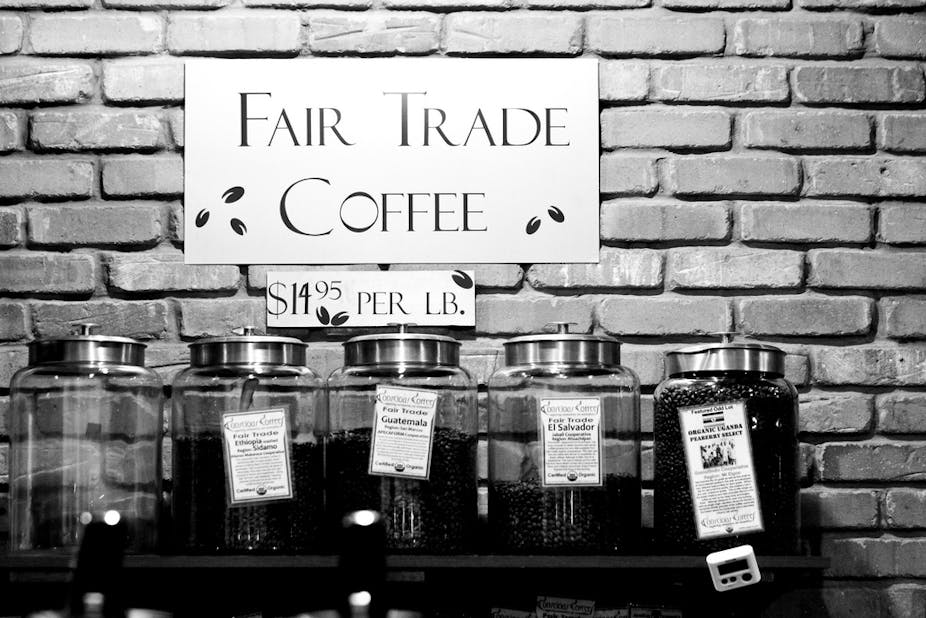That “fair trade” sticker on a bar of chocolate or bag of coffee beans might make you feel better, but there’s no guarantee it’s helping poor farmers. In fact, it may be making their lives worse.
When people make decisions they usually have an intended consequence in mind, based on their mental models of how the world works. Unfortunately our mental models may not fully represent the real world.
What’s more, most of our decisions have unintended consequences that may detract from the intended outcome. This problem arises with “fair trade”.
The Fair Trade Advocacy Office provides a Fair Trade definition.
It says: “Fair Trade is a trading partnership, based on dialogue, transparency and respect, that seeks greater equity in international trade. It contributes to sustainable development by offering better trading conditions to, and securing the rights of, marginalized producers and workers – especially in the South.
"Fair Trade Organizations, backed by consumers, are engaged actively in supporting producers, awareness raising and in campaigning for changes in the rules and practice of conventional international trade.”
On the same web site, the Charter of Fair Trade Principles provides the following motivation for fair trade:
“Fair Trade … is, fundamentally, a response to the failure of conventional trade to deliver sustainable livelihoods and development opportunities to people in the poorest countries of the world; this is evidenced by the two billion of our fellow citizens who, despite working extremely hard, survive on less than $2 per day.”
Is fair trade setting itself up to fail?
In principle, fair trade’s product certification allows a conscientious consumer to choose a product or service that will support a sustainable livelihood in a poor country.
Unfortunately, it is at this step that questions arise. Rather than addressing the underlying causes of human inequality, “fair trade” operates via a fragile change to conventional trade. The Charter says conventional trade fails “to deliver sustainable livelihoods and development opportunities to people in the poorest countries of the world”.
The fragility arises because of a perverse incentive: participating organisations have to capture the benefits of product certification while minimising the costs of doing so.
As a result, the scheme requires intensive regulation by “certifiers”. They have to avoid two types of unintended consequence – developed world consumers lose confidence and stop participating in the scheme, or they continue to pay higher prices for certified products but “middle men” siphon off the additional cash.
From this perspective, the certifiers are, of course, merely one category of “middle men”. There is no escape from the unintended consequence that intermediaries will capture at least a fraction of the discretionary cash flow intended for poor producers.
The remaining issues are how large this “overhead” will be and which intermediaries capture most of it.
Another potential unintended consequence is that producers in poor countries will stop producing traditional crops for local consumption. Instead, they will switch to “cash crops” that are attractive to “fair trade” consumers in rich countries but detract from human welfare in their home country.
Certification doesn’t see the big picture
The concept of food value chains (FVCs) can help explain the problems with fair trade. A recent Science Forum article defines FVCs as “all activities required to bring farm products to consumers, including agricultural production, processing, storage, marketing, distribution and consumption”.
This definition illustrates the “fair trade” challenge. The target group, “marginalised producers and workers – especially in the south”, is only a small link in the chain that brings products to consumers in developed countries.
Some of the products that are going to developed country consumers may have been diverted from poor country consumers that need them. In some cases, the chains set up to bring us “fair trade” products may have completely displaced chains that distribute products in poorer countries.
The people involved in a a food value chain are a social system. The system may be a civic network characterised by mutual respect and reciprocity. It may be a social field characterised by social competition.
Human inequality is a clear indication that human society as a global whole is better characterised as a social field than a civic network. It appears unlikely that “fair trade” will change that.
Is there a better way to support small farmers?
Research Principles for Developing Country Food Chains suggests a more holistic approach to supporting small farmers in poor countries:
Focus on opportunities in domestic markets: we should help poor countries improve their internal food value chains.
Enhance marketing channel efficiency: we should make sure that chains in poor countries are as efficient as possible. This can stop prices in poor countries from becoming artificially high.
Pay attention to indirect effects, not only to increased sales from smallholders: we should try to improve the lot of poor farmers and workers in a more holistic fashion.
Pay attention to post-harvest losses, both in volume and quality: these losses directly reduce the nutrition available to people in poor countries.
Help small farmers conserve natural resources: improved productivity can reduce the impact of food production on natural ecosystems.
Go beyond certification: certification can be costly and exclude smallholder farmers from high-value markets. It may not promote adoption of sustainable farming practices or foster farm-level innovation.
Apart from the above principles, it is clear that in our ever more crowded and constrained global village, we should all live as prudently as possible.

